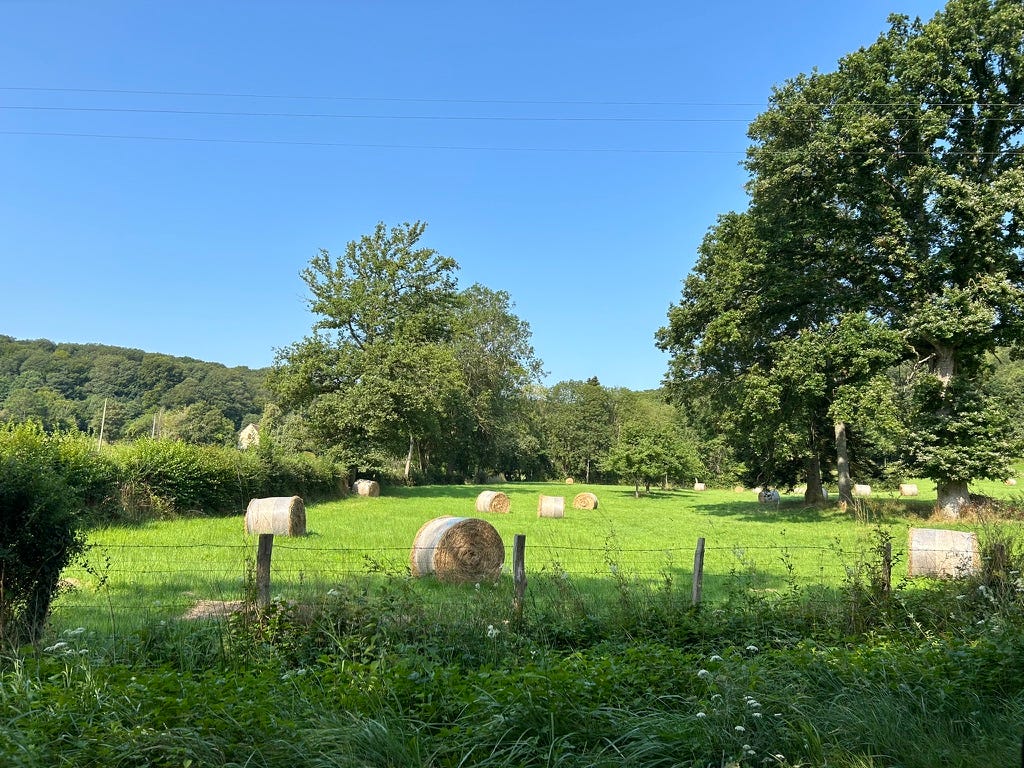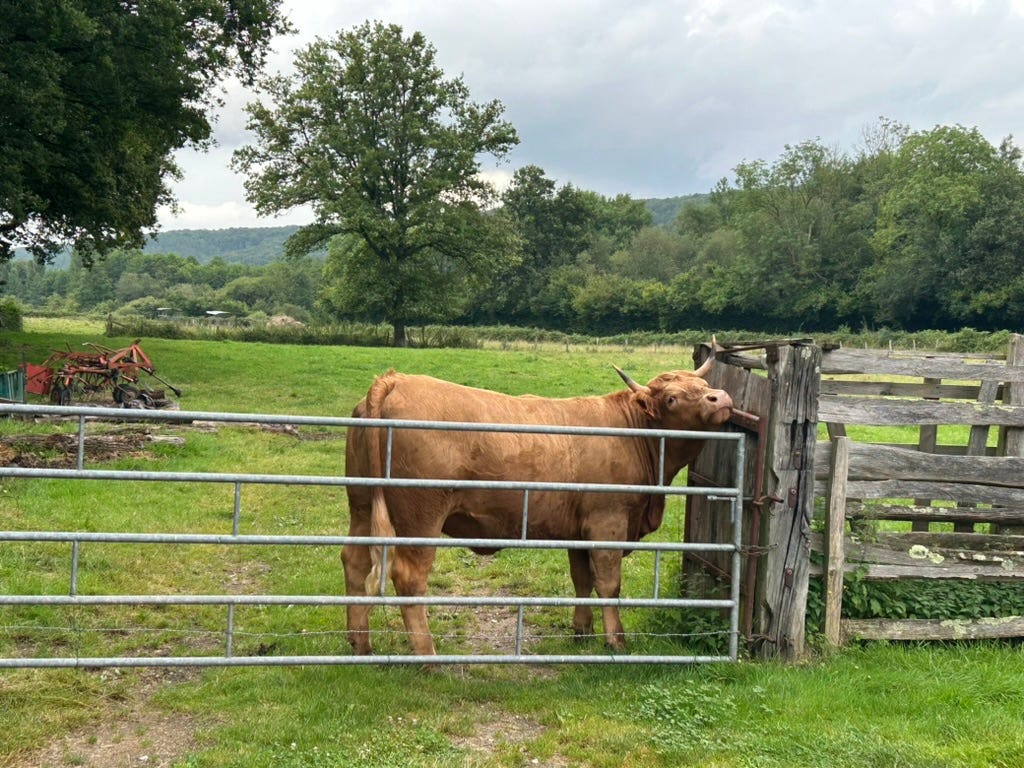Chapter Forty-Three: The Pre-Party
In which I continue to rack up lessons on how to live amiably in a small town.

When Sasha’s dogs gored Stan’s cat, he and I crossed a wide gap from distant, sometimes awkward hellos into up-front, shared tragedy. It was more of each other’s humanity than either of us were prepared for. But in the subsequent times we ran into each other, I was pretty sure we were cool. I gleaned it from the shine in his eyes and the hearty tone of his bonjour. That was a most enormous relief.
There was just the matter of the rest of the village, where you can imagine that hot piece of news spread like herpes at Burning Man. I could plead my case to people like Cassandre and Jean-Yves with confidence that I had the benefit of the doubt. Michel and Simon gasped and rolled their eyes at the mortification factor when I told them, immediately and correctly understanding that, after the horror of the event for Stan and his son, the next worst part was the reputational damage to me.
Everyone was going to draw their own conclusions, but I knew enough about politics to see the importance of getting ahead of a difficult conversation. So I brought it up immediately with people like Angélique and others in the orbit of the Comité des Fêtes, which was about to have its final meeting before the big party. “Did you hear about what my friend’s dogs did? It was absolutely horrible… My living room door has never closed correctly…”
In closing, your honor, we ask that you find me not guilty.
I could not afford to be permanently seen as one of those people who brought in harmful outside influences and threw money and apologies at victims to cover for having acted heedlessly. I hoped to correct what I imagined was the natural counter-take: that we had just blithely let dangerous, killer dogs out because Sasha and I were silly women who came from Paris and had no idea How Things Were. If I was nothing like the rock-solid farmers whose sheep and cows grazed the meadows surrounding Saint-Maxime’s center, or the longtime retirees from elsewhere, who had acquired pride of place after so many years of residence, still I was part of Saint-Maxime now. I had to show it.
My friend Alphonse, an interior decorator married to one of my good friends from Paris, grew up in a tiny village in Belgium. “The biggest sin is not to act badly, the biggest sin is not to be there,” he said when I filled him in on the recent bloody news. So, I was going to do penance by fully participating. This was an especially difficult sentence for an introvert with a permanently low social battery, but it was what it was.
At that meeting, at City Hall, I loudly offered to help with the big dinner on the night of the Fête de Village, “and anything else anyone needs,” supplementing my standing assignment to spend a couple hours in the afternoon selling drinks. After we settled outstanding business (the low-priced ass sausages were en route!), we lingered together over somebody’s homemade hard cider. I took the opportunity to continue to spread my version of the horrible event, hoping to send the message that I knew it was a big deal, and that I wasn’t ashamed or trying to hide anything, because after all, as traumatic as it was, it was also an accident.
I offered Michel and Simon spots in front of my house for the garage sale, which I planned to take part in with bells on, despite not having tons to sell. I also invited Pauline, who lived around the corner from me in one of the prettiest houses in town, a presbytery with a lush, enclosed garden.
She was 15 years younger than I was, single, mostly based in Paris, and didn’t really make the most of her place. If I was someone who had just gone to an enormous amount of trouble to fix my house up only to host rarely, she was a more extreme version, having done most of the work on the three upstairs bedrooms and en-suite bathrooms herself. She was sick of the setup and clean-up that came with renting it on Air Bnb and starting to think about selling.
The eve of the fête Pauline was slightly panicked, telling me she had casually told Stan to stop by for a drink, and she realized now it would be just the two of them. I figured I should go all in, so I told her I’d stick around to be her wing woman.
Stan showed up with his friend Maurice, who lived in the south wing of City Hall, which had been transformed into housing years ago, when it became clear that there would be no population resurgence in Saint-Maxime. They brought a bottle of whisky and as the two dudes proceeded to finish half of it, I learned that Stan was a mechanic, and he restored vintage video games. He was thinking of starting up a company to produce them, he said, as Maurice rolled his eyes and pantomimed that he’d never do anything of the sort. I had never noticed how long Stan’s fingernails were, nor how much grease was underneath them. Normal for a mechanic, I guess, but it didn’t make you want to share a bowl of peanuts. I did anyway.
Maurice was full of gossip: one of the ladies of the village that we all knew apparently had a voracious appetite for men. She had even had a dalliance with Monsieur, the former owner of my house, despite the obvious difference in their ages. (BTW, it’s not Cassandre.)
I wondered if that’s why Monsieur had been hanging out so much lately in the village, though then again I had heard he was basically still couch surfing since selling the place. A few nights previous, he was with some friends over at Angélique’s. I heard their ruckus and popped over for as dry of a kir as I could manage her to make me. Monsieur asked how the house had come along, and, probably due to the booze, I told him to come over for a tour.
I didn’t stay long, and gestured at Monsieur to follow me back across the street. I knew this could be an awkward moment, but I also knew that he had worked in construction enough to potentially be interested in how things had turned out. It was bittersweet showing him how I transformed the bedroom of his two oldest sons, which he had divided into two with a tiny hallway, into a big, lush office, all just for me. He admired the paint colors and especially liked the tommettes in the living room. (They really did turn out well.) But I grew increasingly aware, once again, of how grand it all must have seemed for just one woman.
There many sets of unseen tracks in the village. I lived on the right side of the class tracks. Even if we had both lived in the same physical house, Monsieur did not. I did not live on the right side of the culture tracks, and Monsieur most definitely did. That is a weird thing to stare directly in the face. Living in a tiny village, you do not have the luxury of escaping those realities. But I suppose it’s all well and good. Unlike Pauline, I wasn’t going anywhere. My manor suited me just fine.





